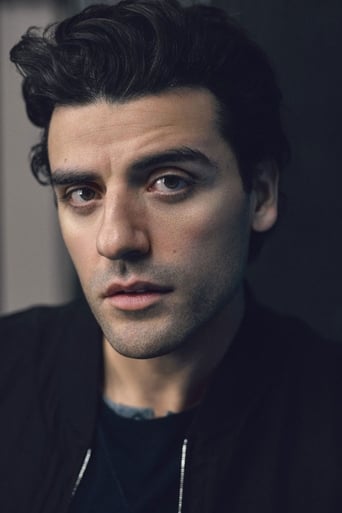Spidersecu
Don't Believe the Hype
CommentsXp
Best movie ever!
Afouotos
Although it has its amusing moments, in eneral the plot does not convince.
ChanFamous
I wanted to like it more than I actually did... But much of the humor totally escaped me and I walked out only mildly impressed.
porgiamor
I loved the cinematography at the beginning of the movie and how it quickly changed into a dark and morose tale of human manipulation. When you cast strong actors such as Elisabeth Olsen, Jessica Lange, Oscar Isaac you have a powerful intense shocking human tale of lust, revenge and tragedy. Oscar Isaac smolders on screen and I found his chemistry with Elisabeth Olsen truly believable during their numerous clandestine rendezvous throughout the first half of this movie. Then the tension just builds up to an incredible ending with both characters totally unravelling and at the end of their tethers. Every single actor in this film was so strong, even the supporting cast: Tom Felton was incredibly unappealing as Camille. Shirley Henderson provided light and shade in her quirky portrayal of Suzanne. Impressive acting throughout. I really enjoyed this movie because it was so dark. Yet the cinematography was so clearly focused. The resolution of each shot was so sharp and appealing to the eyes. I was uplifted at the end of the movie because the type of existence these people had was a living hell. Hey, I thought, my life is not so bad after all, compared to what these miserable people went through...
Vicki Hopkins
Where do I start? Reviewing this melodramatic movie that leaves you dead at the end (no pun intended), is going to be a task. I can honestly classify it as the most depressing film I have seen in a long time. The story is apparently based on a writing by the name of "Thérèse Raquin," written in 1867 by Emile Zola.In short, the movie is about a young girl, who after her mother dies, is placed with her aunt and her sick, coughing cousin. Jessica Lange plays a controlling mother (Madame Raquin), who orchestrates Therese's life at every turn. Her father passes away, and Therese is left with a small annuity. No doubt for her own financial gain, she insists that Therese marry her cousin. Unfortunately, he is not appealing in personality or looks, while she on the other hand is attracted to handsome men and deals with an uncontrollable sex drive.When they relocate from the country to Paris, down a dark and dingy street to open a shop, Therese meets Laurent, a friend of the family. It doesn't take long for the two of them to fall into a lust-driven, sexual relationship that borders on the ridiculous as they meet in secret. Her domineering aunt has no idea that while she is tending the store below, her niece is copulating like a nymphomaniac upstairs in the room she shares with her son. Though you are led to believe it is love between the two, I frankly thought it bordered on physical obsession. Her lover knows how to control her need for him by pleasuring her at every turn, just as well as her aunt who manipulates her to do her bidding.As far as Therese's husband, played by Tom Felton, he is a boring and idiotic man, and a mama's boy. His relationship with his mother is frankly as sickly as his health (cough, cough), as his mother dominates and coddles him into adulthood.Laurent, as sexually driven as Therese, wants her all to himself. He suggests that they orchestrate an accident to do away with her husband. After all, accidents happen every day. Therese is hesitant to carry out the plan, but Laurent takes it to the end when the three of them go boating. He pushes her husband overboard, beats him with a paddle, and they watch him drown. Of course, they are dragged back to shore feigning a terrible boating accident wherein he loses his life. His body is recovered, buried, and no one is the wiser, except for one family friend who has her suspicions.Of course, after the murder and time passes, Laurent and Therese marry and live together with Madame Raquin at the shop. Their relationship turns sour very quickly, as guilt for murdering Camille and their debase personalities come to the forefront. In the meantime, Madame Raquin has a stroke, no doubt brought on by her excessive grief over her son's death, and is left unable to move or speak. As she is confined to a wheelchair, she discovers through their yelling fights with one another that they murdered her son.Well, where does this leave this sordid tale of dysfunctional family, adultery, lust, and whatever else you want to term it? It comes to an end where Therese and Laurent grow to hate each other so much they plot each other's demise. In the end, they both go mad as a hatter, and commit suicide in front of Madame Raquin, who finally obtains justice for her son's murder. The scene is no Romeo and Juliet moment, believe me. Instead, it is a sad commentary to two selfish people who committed a senseless murder that leads to no happy ending.As far as performances, Jessica Lange, I thought carried the insatiable grief about her son's death to a psychotic level. Whether it was the intention of her performance to do so because of the script, I have no idea. However, I thought it felt excessive. Elizabeth Olsen's portrayal, as well as Oscar Isaac's, as the colliding lovers (definitely not star-crossed lovers), were well done conveying the characters' crazy drive for sex and ultimate demise due to guilt that borders on lunacy.The setting overall, especially in Paris, is very dark and gloomy, which frankly mirrors the story. The costumes were mid-Victorian era and dull in color for the most part.If you like depressing, dark, and dramatic period movies that leave you feeling uninspired, this one is for you.
MartinHafer
Thérèse Raquin is a very familiar tale from Émile Zola (1867) and it has been adapted to the stage many times as well movies. I counted at least 15 film versions of the story and they have been made in many languages— including French, German, Swedish, Italian, Spanish and English! In fact, the James M. Cain story The Postman Always Rings Twice (filmed in 1946 and 1981) is STRONGLY inspired by Zola's—so strongly that it's hard to imagine Cain having created his novel without first having read Zola's story or seen it on film. Obviously, Zola's story has touched a lot of people and has become a classic—and it's a wonderfully moving tale that is relatively timeless as the films have been set in many time periods from the mid-1800s to the present. But with so many versions out there, are we ready for yet another?Thérèse (Elizabeth Olsen) has led a rather pitiful life. When she was very young, she was dumped on her aunt and was raised by her. However, it was not an especially happy or loving home. Instead of being treated like a daughter or even a daughter, Thérèse has become almost like a servant. Much of her time has been spent taking care of her weak and sickly cousin, Camille (Tom Felton). And, after years of doing this, the aunt, Madame Raquin (Jessica Lange), insists that Thérèse marry Camille. This is certainly no great love match—more a way to guarantee that Camille will have a woman to care for him after Madame Raquin's death.After the marriage, the trio move to Paris and they open a small shop. Thérèse's days are spent tending the shop, her evenings are spent caring for Camille and during their free time, the three have friends over so that Camille and his mother can play dominoes. This is their life--very predictable, a bit dull and lacking in love. Not surprisingly, deep within Thérèse longs for something more—and it's easy to feel sorry for the young woman—especially since no one ever seems to worry about her needs.One day, Camille brings home an old friend, Laurent (Oscar Isaac). How the two are friends is difficult to imagine, as they are quite different. In contrast, Laurent is an artist and is much more outgoing and handsome. Soon, he and Thérèse become lovers. As time passes, they realize that they cannot go on like this—something has to give. Plus, Camille insists that the family move back to the country. But, instead of breaking up, the pair comes upon the idea of killing Camille! However, Camille is not a bad guy. He's inept as a husband, but he's also decent and really cares about his wife—and that is what makes the lovers' plan so reprehensible. However, I should point out that all this is relatively early in the film. What follows is an interesting psychological portrait of two people whose beastly actions are, ultimately, their undoing. How does all this play out? If you want to know, see this film—and I do strongly recommend you do.In Secret manages to tell Zola's story quite well. Although there apparently were quite a few changes in the cast according to IMDb (many folks dropped out or were replaced), the film comes off beautifully—not that it's a beautiful story, mind you! The acting is quite good, the mood (such as the music, colors and cinematography) are appropriately grim and the story has an extremely strong ending. Well worth seeing, but I must warn you that it's not what I would consider a pleasant story. Not surprisingly, I do NOT recommend this film to children! It is about adultery and murder and only the most insane parent would want their kids watching this! However, I think it's appropriate for teens and older, as it is definitely not some fluff piece glamorizing these behaviors but a well thought out story about human nature—particularly the worst aspects of it! This film is currently available on DVD as well as through Netflix. Also, an interesting note is that Jessica Lange starred in the 1980s remake of The Postman Always Rings Twice AND stars as Camille's mother in this film. She and the rest of the cast were excellent.
skalwani
When I usually go to see movies which cover a past period of time, I take the trouble of not reading too much about the background or skipping the book it is based on, so that I may judge the product purely on its merits and the strengths of the entire production crew that went into it's making. It pleases me to share with you that "In Secret" ranks as one such fine effort, right from the beginning it transports you to the mid-1800s era of rural France, and tells us the story of little Therese Raquin (Elizabeth Olsen). This effort has good production values, for not even a single moment does your attention drift away from the development of the characters, seeing them grow up, make the ties binding to the extent that Therese clearly suffers from the over bearing domination of her mother-in-law, played brilliantly by Jessica Lange. She gives the entire movie a continuation of the thread for the story, at times you feel her looks, demeanor and restrained but piercing performance, towards the end, are very absorbing. Hats off to the casting crew for making the right call here, she was born to play this role.I wish to thank my fellow cinema mates - Isabelle and Lisa (you know who you are!) - for sharing their insights with me post the viewing. Correct use of lighting does give this piece the right feel of the suffocating & dreary lower working class Paris conditions, the same dark focus and clever use of perspective subtly nudge the viewer into feeling very tense as the story of betrayal develops. The very same way the characters demons grow, speaks to the way all of them absorb the souls of the players and share them with us flawlessly. As my fellow cinema watchers also shared with me, this movie is not for everyone, and only serious lovers of subtle simple but powerful period stories will appreciate this work. I suspect they are also right in anticipating that we may see many more French literary pieces coming to life on the big screen in the next few years. I give this movie an 8 star rating, simply because I appreciated every frame contributing to the telling of the story, no wasted effort or superfluous diversions whatsoever.






